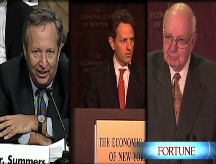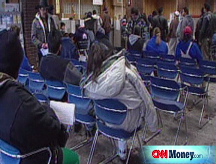Stocks rally despite bad news
Wall Street manages gains after two-session retreat despite GM and Ford losses and a brutal labor market report.

NEW YORK (CNNMoney.com) -- Stocks rallied Friday, with investors using Wall Street's record-breaking slide over the last two sessions as a reason to scoop up battered shares, despite a brutal October jobs report and GM's massive quarterly loss.
The Dow Jones industrial average (INDU) added 248 points, or 2.9%. The Standard & Poor's 500 (SPX) index gained 2.9% and the Nasdaq composite (COMP) added 2.4%.
All three major stock gauges fell for the week, after last week's big rally. The Dow and the Nasdaq both lost 4.2% in the week, while the S&P 500 fell 3.8%.
Stocks had been in the plus column throughout the session, losing some steam after the late-morning release of General Motors' big loss, before recharging. Stocks again lost some ground ahead of President-elect Barack Obama's afternoon press conference.
However, stocks managed gains as investors took advantage of a big selloff. Stocks plunged sharply in the two sessions following Obama's historic victory, with recession fears sparking a retreat after a sharp rally through Election Day. The Dow had lost 929 points, its biggest two-day point loss ever.
"The GM news is a disaster, the jobs market was a mess, but because you had the Dow down almost 1,000 points in the last two days, they aren't going to take it lower just yet," said Joseph Saluzzi, co-head of equity trading at Themis Trading.
Additionally, the market may have already accounted for a lot of the abysmal economic news that is on the way through the end of the year, said Bill Stone, chief investment strategist at PNC Financial Services Group.
"In the face of really horrible economic news, the market has mostly either held steady or gained," he said. "That's a good sign, because the fourth quarter is looking pretty awful."
Employers cut 240,000 jobs from their payrolls in October, marking the 10th straight month of cuts. That brought the number of job losses in 2008 to nearly 1.2 million. The unemployment rate, generated by a separate survey, surged to 6.5%. Both figures were worse than expected, according to a Briefing.com survey. (Full story)
Obama said the economy is facing the "greatest economic challenge of our lifetime," and said he will take all necessary steps to confront the crisis. He said if a second stimulus package is not passed by the lame-duck Congress that it will be his first priority once he takes office on Jan. 20.
Automakers: GM (GM, Fortune 500) posted a third-quarter operating loss of $4.2 billion, or $7.35 per share, far worse than expected. GM said it burned through $6.9 billion in the quarter and is running out of cash. The company also indicated that merger talks with Chrysler have ended. Shares plunged 9%. (Full story)
Ford Motor (F, Fortune 500) reported a $3 billion operating loss in its latest quarter and said it would cut staff and capital spending in order to hang on to capital. Shares rose 2%. (Full story)
Ford and GM shares have plunged this week on worries about their ability to stay afloat without government help. Along with Chrysler, the heads of Ford and GM met with Congressional leaders Thursday to discuss a potential bailout.
A study released earlier this week showed that should any of the Big Three fail, it would cost the economy as much as 3 million jobs and $60 billion in the first year alone.
Market breadth was positive. On the New York Stock Exchange, winners beat losers by seven to three on volume of 1.26 million shares. On the Nasdaq, advancers topped decliners three to two on volume of 1.93 billion shares.
Bear-market rally: In the two sessions following the election, the Dow lost 929 points, its biggest two-day point decline ever, according to Dow Jones. The percentage decline was 9.7% and the Dow's worst two-day percentage drop since Oct. 1987.
The decline followed what some market pros consider to be a classic bear-market rally, an 18% surge on the S&P 500 in the seven trading sessions through the election.
During that rally, investors put money into equity mutual funds for the first times in 15 weeks, according to tracking firm Trim Tabs. The amount of money invested by equity mutual funds in the week ended Nov. 5 totaled $2.2 billion versus the $9.2 billion withdrawn during the previous week.
Prior to that short rally, the S&P 500 had slumped 35% in the six weeks since Lehman Brothers declared bankruptcy on Sept. 15.
Part of the selling this fall - and over the last two days - has been from hedge funds needing to sell in order to meet redemption requests. Many hedge fund investors can withdraw money on Dec. 31, but must first submit a request either 90, 60 or 45 days ahead of time. A 45-day notice means requests will need to be in by the end of next week. Managers have been selling billions in securities in anticipation of the requests from investors. Managers have also been selling to raise cash to pay back their lenders.
The Wall Street Journal reported Friday that part of the massive two-session selloff was as a result of selling on the part of Citadel Investment Group. The $16 billion hedge fund has reportedly been asked by several banks to post additional collateral to cover big losses, the Journal reported.
Economy: Three other economic reports were released Friday.
Pending home sales fell 4.6% in September, after rising 7.5% in the previous month. Economists surveyed by Briefing.com thought sales would fall 3.4%.
Another report showed wholesale inventories fell 0.1% in September after rising 0.6% in the previous month. Economists thought inventories would rise 0.3%.
A third report showed borrowing by consumers increased in September by more than had been expected.
Most economists and consumers believe the economy is in recession, although it has not been officially declared yet. Signs of the recession were evident in economic news released earlier in the week, including dour readings on manufacturing, factory orders and the services sector.
In an afternoon speech, Atlanta Federal Reserve Bank President Dennis Lockhart said that "recent data indicate that the national economy is in recession."
Fed officials have largely avoided the "R" word so far. Lockhart is not a voting member of the Fed's policy-setting committee in 2008.
Other markets: In global trade, Asian markets were mixed, with the Hong Kong Hang Seng ending higher and the Japanese Nikkei ending lower. European markets ended higher. On Thursday, both European and British central banks cut interest rates.
The dollar fell against the euro and gained versus the yen.
COMEX gold for December delivery rose $2 to settle at $734.20 an ounce.
U.S. light crude oil for December delivery settled up 27 cents to $61.04 a barrel on the New York Mercantile Exchange, after ending the previous session at a 19-month low.
Gasoline prices fell another 2.6 cents to a national average of $2.314 a gallon, according to a survey of credit-card activity released Friday by motorist group AAA. The decline marks the 51st consecutive day that prices have decreased. During that same time period, prices dropped by $1.54 a gallon, or 40%.
Lending rates: The credit market continued to improve. The 3-month Libor fell to 2.29% from 2.39% Thursday, a nearly four-year low, according to Dow Jones. Overnight Libor held steady at 0.33%, after falling to an all-time low of 0.32% earlier this week. Libor is a key interbank lending rate.
The yield on the 3-month Treasury bill, seen as the safest place to put money in the short term, inched lower to 0.28% from 0.29% Thursday, with investors preferring to take a small return on their money than risk the stock market. Last month, the 3-month yield reached a 68-year low around 0% as investor panic peaked.
Treasury prices slumped, raising the yield on the benchmark 10-year note to 3.78% from 3.69% late Thursday. Treasury prices and yields move in opposite directions.
Did you vote for Obama? How do you think the new president will affect your wallet? What do you think Obama needs to do to fix the economy - both in the short run and the long term? What should be first on the new Congress's agenda? E-mail us your thoughts, including your name, photo and contact info; the best answers will be featured in an upcoming CNNMoney.com article. ![]()




